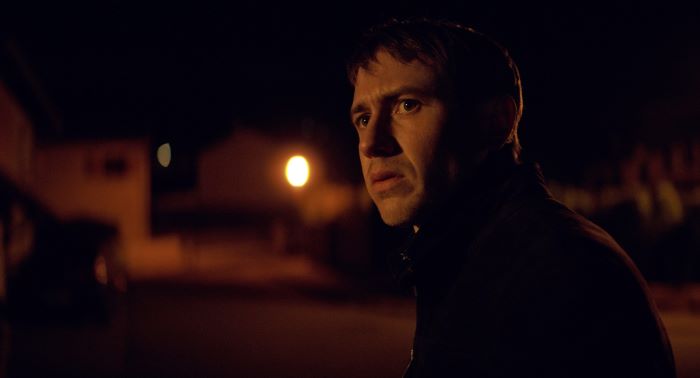![]() Dominick Moll’s The Night of the 12th won six César awards (the French Oscars), including best film, best director, and best screenplay. And for once, an awards organization got it right: The film is an absorbing and disturbing police procedural that delves into deeper, more insidious subject matter.
Dominick Moll’s The Night of the 12th won six César awards (the French Oscars), including best film, best director, and best screenplay. And for once, an awards organization got it right: The film is an absorbing and disturbing police procedural that delves into deeper, more insidious subject matter.
Based on a true story, the film opens with a title card explaining that more than 800 murders are investigated in France every year, and of those, 20 percent are never solved. Moll explores one of those unsolved killings, a young woman named Clara (Lula Cotton Frapier). Right after leaving her best friend’s house late one night, she is gruesomely burned to death by a masked man who obviously knows her (he calls out her name before dousing her with gasoline and setting her aflame).
After this unsettling sequence, Moll cuts to a friendly get-together for the retiring head of the local detective squad in Grenoble. Yohan Vivès (Bastien Bouillon), younger than his predecessor but equally committed, becomes the new squad leader, and is immediately thrust into this horrific case. The director intelligently keeps most of the detectives’ personal lives offscreen, but certain information leaks through—mainly through their conversations about their non-professional relationships—so that we are aware of how outside factors can color their work.
Moll methodically chronicles Yohan’s equally careful investigation, which begins when Clara’s disbelieving mother is notified of her daughter’s death, then moves onto interviewing Clara’s best friend, Nanie (Pauline Serieys), whose house Clara left that night and to whom Clara sent a final, touching video celebrating their friendship only seconds before she died, as well as several young men with whom Clara had physical relationships. That’s where matters become tricky for the police: They don’t want to fall back on the canard that, because of her private life, Clara deserved or in some way contributed to her fate. Once, when one of the team almost casually brings this up, Yohan angrily confronts him.
The Night of the 12th morphs from a fascinating procedural, in which the continuous dead ends affect the psyches of the investigators, into a sadly damning portrayal of innate misogyny. Early on, Yohan is upset that Nanie did not tell him about certain men Clara had known. Nanie retorts that she felt she had to defend Clara because she was dead. Later, while talking with Yohan about the case, Nadia (Mouna Soualem)—a young detective who has joined the team while the case has receded into the background—asks him, “Don’t you find it weird that most crimes are committed by men and mostly men are supposed to solve them?” After a moment, she answers her question by saying three words: “A man’s world.”
As every promising lead fizzles out year after year, Moll’s film becomes deeply frustrating, intentionally, and the disappointment over the cops’ failure to find Clara’s murderer has physically and emotionally changed Yohan. Yet there are moments that keep Yohan from completely losing hope, such as when Nadia tells him, “The dead stay with us forever, and the important stuff we do is for them.”
Then there are the periodic shots of Yohan as he bicycles around a velodrome track, a ritual that takes on a form of therapy as the case’s answers keep eluding him. In a voice-over, he tells a former investigator about the recent failures in cracking the case while riding his bike on a road that is punishingly steep, quite unlike the oval track he’s used to. As Yohan admits to trying something different in his cycling routine, perhaps—Moll tantalizingly suggests—such thinking might eventually pay dividends in tracking down Clara’s killer.

















Leave A Comment